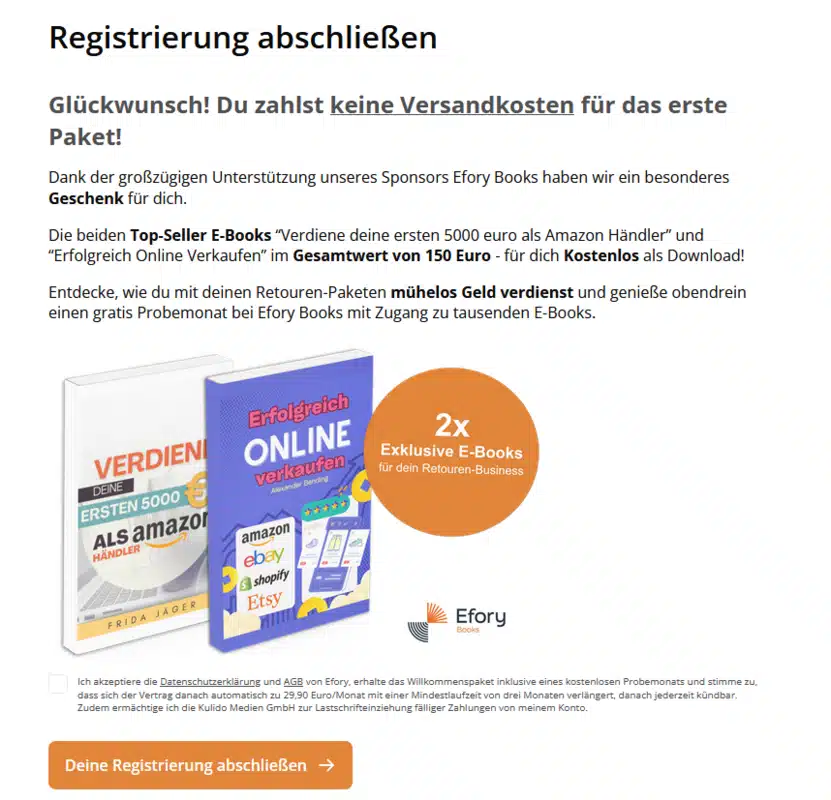Sustainability and recycling are becoming more and more important, and offers that promise an almost free distribution of returned but fully functional products appear at first glance to be a win-win situation. The website “produktretter.at” and similar platforms such as “produkttest-anmelde.com” or “retourenheld.io” use this positive perception to address a broad target group. The attractiveness of such offers is undeniable: for a maximum shipping cost of 2.99 euros, customers should receive high-quality products that would otherwise be thrown away. But behind this facade there is a treacherous subscription trap that costs the consumer more than just the low shipping costs.
Tempting offers with hidden costs
The mechanisms used to lure potential victims to these sites are varied, ranging from sponsored ads on Google to seductive commercials on YouTube. The message is always similarly tempting: high-quality products from online returns are free, only shipping costs apply. But the reality looks different. Registering on these sites is quick, but requires sensitive data such as name, address and bank details. The decisive step into the subscription trap is often only recognizable by accepting a barely visible notice in the small print. This notice usually states that a paid subscription will automatically begin after a free trial month.

The problem of broken promises
The reports from disappointed users show a consistent picture: the promised products never reach the recipients. The real intention of such websites seems to be to collect data and take out subscriptions. What is particularly disturbing is that these practices are not limited to individual websites. A number of websites with a similar structure and promises have already been identified, indicating a widespread problem.
How to protect yourself from subscription traps
The golden rule on the Internet is: Nobody has anything to give away. Offers that sound too good to be true should be examined carefully. This includes reading the small print as well as a short online research about the reputability of the respective site. Particular caution is required when personal data or even account information is requested.
Questions and answers about “produktretter.at”:
Question 1: What makes the sites “produktretter.at” and similar ones dubious?
Answer 1: The sites “produktretter.at” and similar ones entice you with free or almost free products, but hide a subscription trap in the small print and do not deliver the promised products.
Question 2: How does the subscription trap work exactly?
Answer 2: After a seemingly non-binding registration in which personal data is requested, the offer in the small print turns out to be a paid subscription.
Question 3: How can you protect yourself from such subscription traps?
Answer 3: By checking the offers carefully, reading the small print and finding out about the provider online before disclosing personal information.
Question 4: What to do if you have already fallen into a subscription trap?
Answer 4: You should contact the provider, dispute the conclusion of a subscription contract and demand the money back. You can also inform your bank and consider further legal steps.
Question 5: Are there any signs that indicate a subscription trap?
Answer 5: Yes, this includes offers that are too cheap, requests to enter sensitive data and hidden costs in the small print.
Conclusion on “produktretter.at” etc. Web pages
The promises made by websites like “produktretter.at” are deceptive and can cause consumers financial difficulties. It is important to remain vigilant and check offers carefully. Hidden costs, requests to reveal personal information and lack of promised products are clear warning signs. In the event of a scam, it is important to act quickly and take the necessary steps to get your money back. Ultimately, education is the key to protecting yourself and others from such scams. Let us remember that in the digital age, skepticism is a virtue that can save us from many pitfalls.
Stay committed to online fraud awareness by subscribing to the Mimikama newsletter at https://www.mimikama.org/mimikama-newsletter/ and our online lectures and workshops at https://www.mimikama. education/online-lecture-by-mimikama/ visit.
Source: watchlist-internet.at
Also read:
Notes:
1) This content reflects the current state of affairs at the time of publication. The reproduction of individual images, screenshots, embeds or video sequences serves to discuss the topic. 2) Individual contributions were created through the use of machine assistance and were carefully checked by the Mimikama editorial team before publication. ( Reason )

